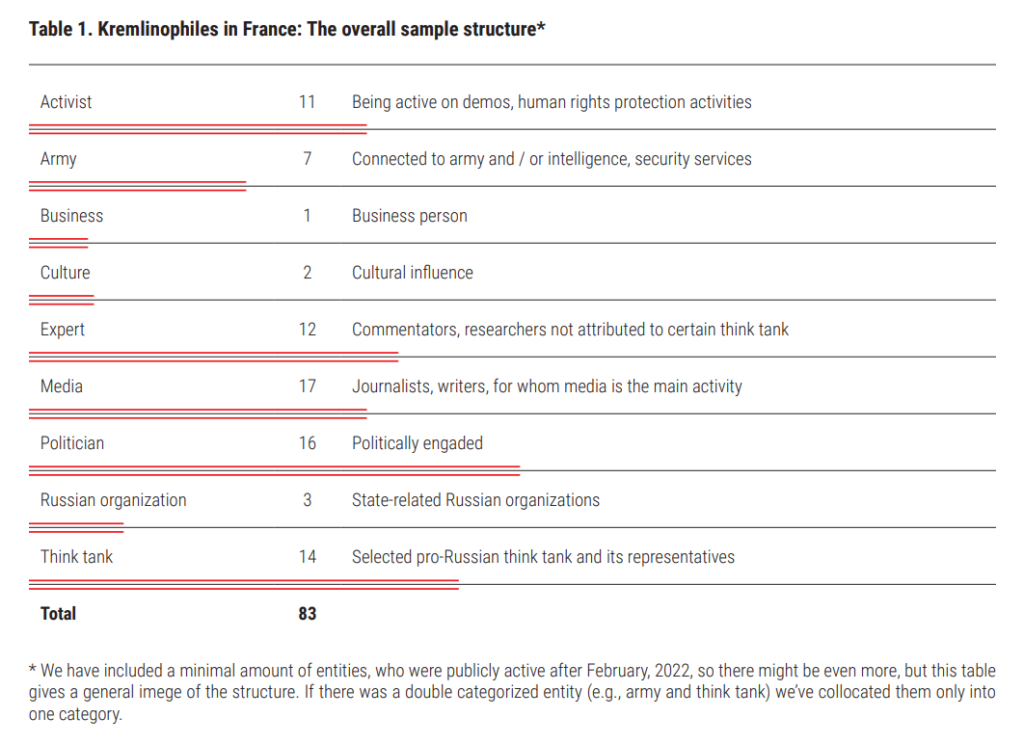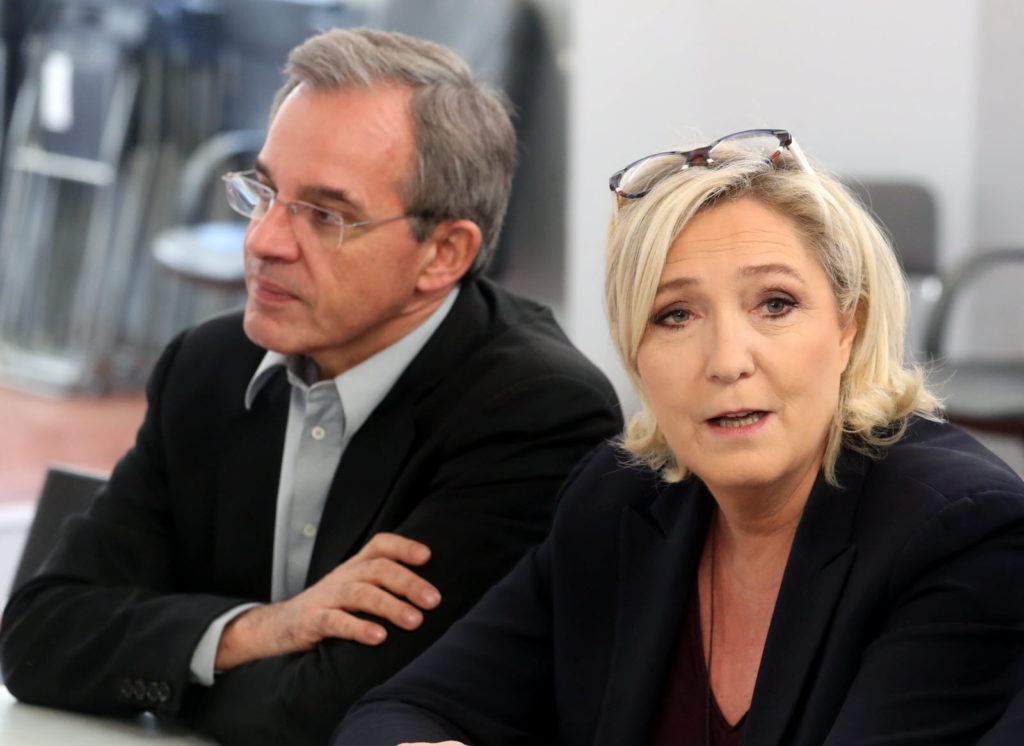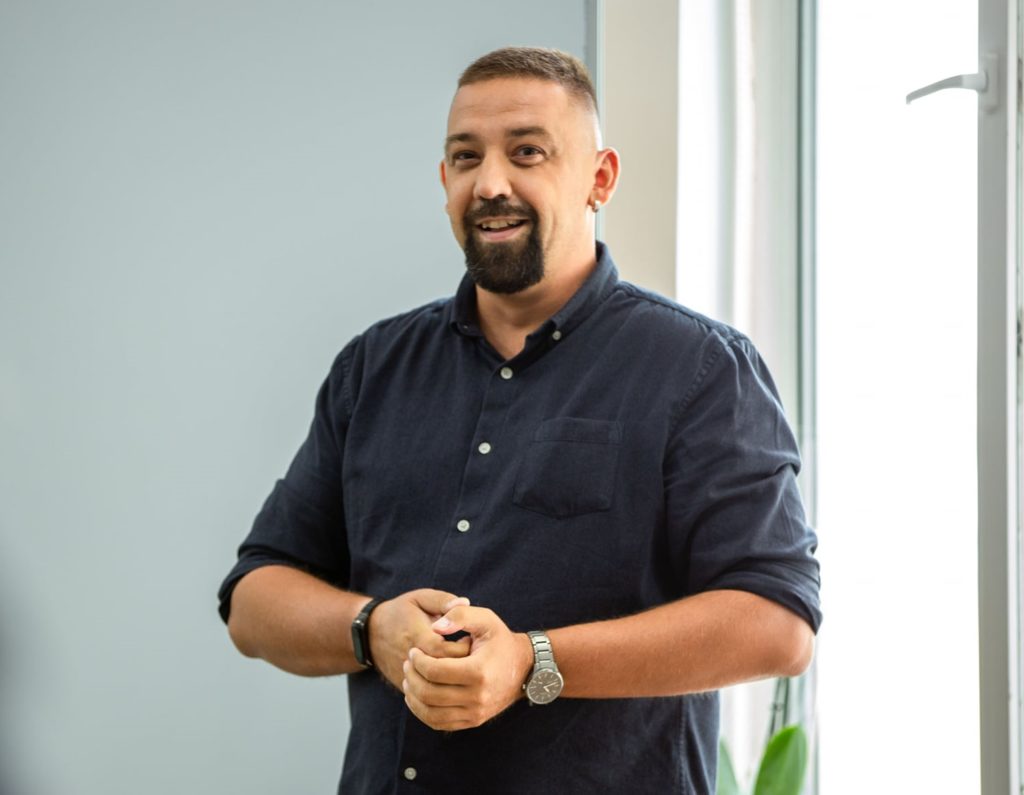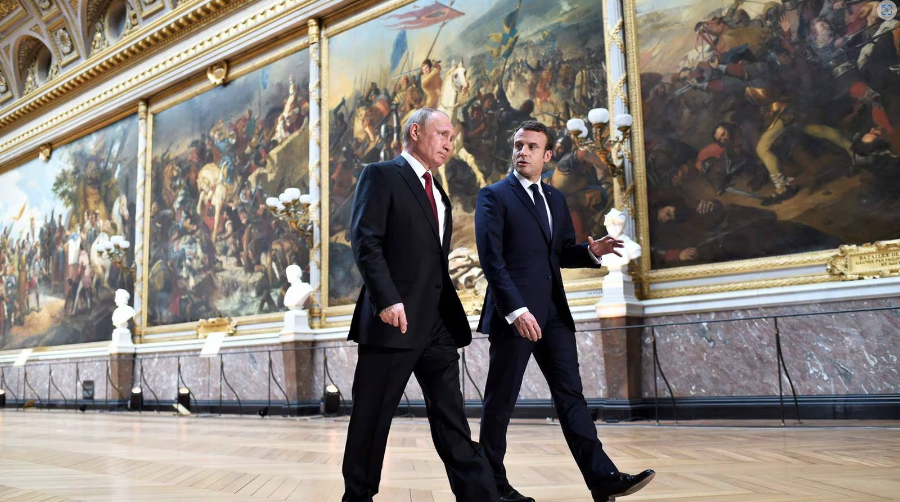Russian influence in France is systemic and sophisticated. One of its most striking features is that the Kremlin is supported by retired high-ranking French military officers – in particular generals and former intelligence officials. Pro-Russian politicians include former presidents and prime ministers.
A new report “Revealing Russian Influence in Europe” identified 83 active pro-Kremlin voices across the French military, political, media, and diaspora spheres. This highlights the various forms of Russian influence in European politics and societies.
The report analyzes publicly available information about Russia's influencers across media, digital platforms, political parties, business groups, and lobby groups. In total, 360 pro-Russian lobbyists were identified in Germany, France, Italy, and Ukraine seeking to undermine sanctions on Russia and support for Kyiv.
Thanks to this research, Euromaidan Press can spotlight key instances of Russian influence in France to enhance public awareness and resilience. It builds on previous coverage of German networks, where 133 Russian agents were identified.
Moscow's pillars of strength in France
Among the key instruments Russia uses to exert influence in France, the following stand out:
1. Russian immigrants
Since the arrival of a wave of Russian émigrés in the 1920s fleeing the 1917 revolutions, the Kremlin has sought to leverage this community within the French political and cultural elite to be sympathetic to Russian interests. Many became important figures in culture and business, providing links between French firms and Russian markets.
"The 'old' emigre community plays a substantial role," Oleksiy Nabozhniak, a co-author of the report, told Euromaidan Press. "Russians tend to congregate around 'their own.' Such emigrants are usually the foundation of local communities, parishioners of branches of Russian churches, although they are fully integrated into French society."
2. Right-wing political parties
The far-right Rassemblement National (former National Front) party has long-established ties with Russia. Yet it may be Moscow’s links with Les Républicains, France’s traditional center-right party, that are most important. It has a pro-Russian bloc including former President Nicolas Sarkozy and former PM François Fillon.
3. The Russian Orthodox Church
Through the 2007 reconciliation between the Moscow Patriarchate and Russian Orthodox Church Outside Russia, Russia regained control of émigré parishes. The opening of the Russian Orthodox Spiritual and Cultural Center spanning over 4,200 square meters in central Paris demonstrates that Russia selected France to showcase its resurgent power in Western Europe.
4. A shared interest in a politics of “sovereignty”
In both Russia and France, a shared "sovereigntist" worldview prioritizes national interests over the EU and global bodies. This manifests as preferences for protectionist economics, opposition to immigration, and adherence to traditional gender/sexuality norms. While the French left dismisses the cultural aspects, they agree with Moscow's critiques of EU political dominance and globalized trade.

Pro-Russian top politicians in France
Numerous politicians in France, spanning the political spectrum from right to left, endorse pro-Russian narratives. We highlight just the most prominent names.
The Rassemblement National party leader Marine Le Pen has echoed Kremlin talking points over Ukraine both before and since Russia's 2022 invasion. A French parliamentary probe uncovered long-running Russian interference in Le Pen's politics - from party members legitimizing the annexation of Crimea to evidence of Moscow bankrolling her movement's growth.
Former French President Nicolas Sarkozy is well known for his sympathies towards Putin and advocacy for closer France-Russia ties. In an August 2023 interview, he called for compromises with Russia, halting Western arms supplies to Ukraine, and not pressing the issue of returning Crimea to Ukraine.

Former PM
François Fillon retired from public life in 2017 and until 2022 served on the board of directors of two Russian companies, one of which was state-owned.
Far-right leader Eric Zemmour has heavily promoted Russia as a more reliable ally than Western countries and said that he dreams of a “French Putin”.
Left leader Jean-Luc Mélenchon said that the annexation of Crimea by Russia was legitimate and opposed the European sanctions adopted in response. In the EU parliament he voted against all forms of cooperation with Ukraine, even on science.
A special spot among proponents of Russian propaganda belongs to Pierre de Gaulle, grandson of the French WWII hero and former President Charles de Gaulle. Despite having no credentials, by leveraging his lineage and pro-Russian stance, de Gaulle has become a fixture on Russian media channels. He claimed Russia is "fighting for traditional values" in Ukraine and that "NATO has lost." In 2023, De Gaulle stated it would be an "honor" to receive Russian citizenship.

Retired security elite boost Kremlin messaging
Retired generals of the French army and intelligence agencies actively participate in Russian propaganda efforts.
Former head of the Situation Intelligence Department of France, General Vincent Desportes, former Commander of the Special Operation Forces of France, Colonel Jacques Hogard, and retired General Dominique Delawarde participated in the event concluding that NATO was responsible for the war against Ukraine.

Former Deputy Chief of French army Headquarters general-major Bertrand de La Chesnais publicly accused NATO of provoking the war against Ukraine.
Former Chief of the French Defense Staff General Pierre de Villiers stated that the war in Ukraine "is not our war," and that European leaders could pressure for a "diplomatic solution from above." Gen. de Villiers' brother is former French Minister of Culture Philippe de Villiers, a prominent pro-Russian politician.

Former Intelligence chief of the French General Directorate for External Security
Alain Juillet hosts security and geopolitics program La Source on Russia’s state media RT France.
Former Head of French Military Intelligence Christophe Gomart persistently convinces the French society that “France is being disarmed by supplying arms to Ukraine”.
Pro-Russian think tanks in France
France has numerous think tanks and analysts that echo Russian propaganda narratives. These include economists, sociologists, retired French generals, and intelligence officers who regularly appear in Russian and pro-Russian media. They publish reports and books aligned with the Kremlin's propaganda on the Ukraine war and Russia's geopolitical prospects.
According to Oleksiy Nabozhniak, a network of analytical centers working on international and military issues that propagate Russian narratives is a distinct feature of France. These centers typically employ several high-ranking retired military leaders or intelligence officials, allowing them to justify their positions based on experience.
"Often these are truly influential structures with respected experts. However, as soon as the conversation turns to Ukraine, they switch to 'it's not all so clear-cut,' 'we can't provoke Russia,' 'Ukraine is itself to blame,' 'NATO was asking for it,' and other delusions," the analyst says.
Geopragma is led by Caroline Galactéros, who is known for far-right ties, pro-Russia stances, and anti-American statements. This allows her to appear in Russian media promoting narratives like Ukraine starting the war and needing demilitarization. Geopragma publishes articles claiming that Russia can't be defeated militarily, and that Ukraine should cede occupied territories. Other Geopragma figures include retired General Jean-Bernard Pinatel, who states that France should leave NATO.
Stratpol makes content that supports core Kremlin narratives including the inability to defeat Russia militarily, Ukraine foreign policy failures, risks of arming Ukraine, and threats of increased terrorism. Its head Xavier Moreau has worked as a business consultant in Moscow since 2000 but in recent years became a key mouthpiece for Kremlin narratives. He may have ties to Russian intelligence.
The French Center for Intelligence Studies (CF2R) focuses on military research but its generals and former intelligence officials frequently showcase anti-Western and pro-Russian positions. A CF2R leader, Eric Denécé, echoes Russian propaganda like Zelenskyy is a US puppet, and the invincibility of the Russian military. CF2R content on Ukraine predominantly repeats Russian narratives about a US-Russia proxy war Europe shouldn't join. After the Bucha massacre was exposed, CF2R figures doubted Russian culpability.

The Franco-Russian Dialogue Association, led by MEP Thierry Mariani, operates as a pro-Russia lobbying group, masquerading as a platform for French-Russian communication. Mariani, previously linked to Russian oligarch Konstantin Malofeev, a financier of the Donbas war, has been instrumental in spreading Russian propaganda on Ukraine. Co-founded by Vladimir Yakunin, former head of Russian Railways and a close associate of Putin, the association and its members regularly oppose arms supplies to Ukraine, with Mariani going as far as blaming Ukraine for the war.
Russian organizations in France
The Russian House
cultural center in France actively promotes propaganda through events and trips targeting the Russian diaspora community. This includes organizing celebrations like one for the birthday of the Artek children's camp located in Russian-occupied Crimea. A local Russian group has brought French schoolchildren to the camp, violating both international law and Ukraine's territorial integrity amid Russia's ongoing illegal annexation.

The Russian House also contains an office for the Russian Geographical Society in Paris. This organization serves as another propaganda vehicle, bestowing awards upon French travelers, organizing lectures, and encouraging tourism to Russia. Notably, Russian Defense Minister Sergey Shoigu presides over the Society, and its board of trustees is headed by President Vladimir Putin.
Another Russian-owned building in central Paris is the Russian Orthodox Spiritual and Cultural Center. This complex is run by the Russian Foreign Ministry, not the church. Opened in 2016 close to French presidential offices, this led some experts to criticize potential espionage risks. Alongside religious functions, the center hosts secular events to promote Russian narratives. After Russia's 2022 invasion of Ukraine, the center's leadership echoed Russian lies.

The Russian Orthodox Church in France is represented by the Korsun Diocese, with over 20 parishes/monasteries, and 18 parishes of the Russian Orthodox Church Abroad established by Russian émigrés in the early 1900s. There is also Moscow Patriarchate representation in Strasbourg. The Russian church has traditionally been closely intertwined with the Russian state and intelligence services.
Also, the hotspots of Russian propaganda are hundreds of local Russian immigrant organizations. They are united by the Coordination Council of Russian Compatriots of France, which is part of the International Council of Russian Compatriots. Both organizations work with embassies, the Russian Ministry of Foreign Affairs, and Russian state agency Rossotrudnichestvo. They organize joint events, such as the propagandist march “Immortal Regiment” using Z-symbolism.
"Rossotrudnichestvo urges diasporans to 'step outside their communities' and wield influence not just on fellow emigres but by representing Russia's interests more broadly," says Oleksiy Nabozhniak.

Russian and pro-Russian media
The main Russian outlet broadcasting Kremlin propaganda in France remains RT France, a part of the Russian state propaganda holding “Russia Today”. Although RT France formally ceased broadcasting it still has an online presence.
Beyond state media, a range of local pro-Russian platforms operate for ideological reasons. These include the Omerta media group, with editorial ties to former RT France journalists and far-right French politicians. Omerta frequently publishes content favoring Moscow's messaging on Ukraine.
Other pro-Russian narratives appear in publications like the left-wing Marianne magazine, right-wing Valeurs Actuelles, and the conservative, populist Front Populaire from philosopher Michel Onfray.
Additionally, dozens of smaller pro-Russian websites, blogs, Telegram channels and Facebook groups spread Russian propaganda among French audiences.
A major issue in France is pro-Russian mainstream correspondents visiting occupied territories in Ukraine without Kyiv’s consent and seeking “balance” in Russia. Oleksiy Nabozhniak also warns about French TV shows interviewing Russian propagandists to seem “impartial”.
"For example, Russian State Duma Deputy Chairman Pyotr Tolstoy speaks French well and regularly appears on local media outlets to voice the Russian position," notes the analyst.

While pro-Russian elements in France may not directly influence official policy on Russia and Ukraine, their significant public support remains a cause for concern.
"The political success of right-wing populist forces in France is still alarming," notes Oleksiy Nabozhniak. In the 2022 election, candidates Le Pen, Mélenchon, and Zemmour collectively garnered over half of the first-round votes, contrasting with Macron's 27%. "So neither Ukraine nor the EU can 'relax'."

With RT France formally closed but still active online, other platforms have taken up its propaganda, often promoting neutrality and emphasizing historical ties with Russia. Pro-Russian analysts still appear in mainstream media, including former military and intelligence experts who may influence current officials.
Investigations like those concerning Le Pen show real Russia ties, not rumors. More government and civil society efforts are needed to debunk Russian narratives and warn of costs of delays in arming Ukraine and expanding sanctions against Russia. Further investigations can help diminish the influence of propaganda and encourage the spread of verifiable information.
Read more:
- France exposes Russian propaganda network undermining Ukraine support
- France accuses Russia of fake news campaign after debunked mercenary strike
- Report: Western media underestimate Russian propaganda's effectiveness
- Russian war propaganda: strategic/tactical narratives, and their audiences

